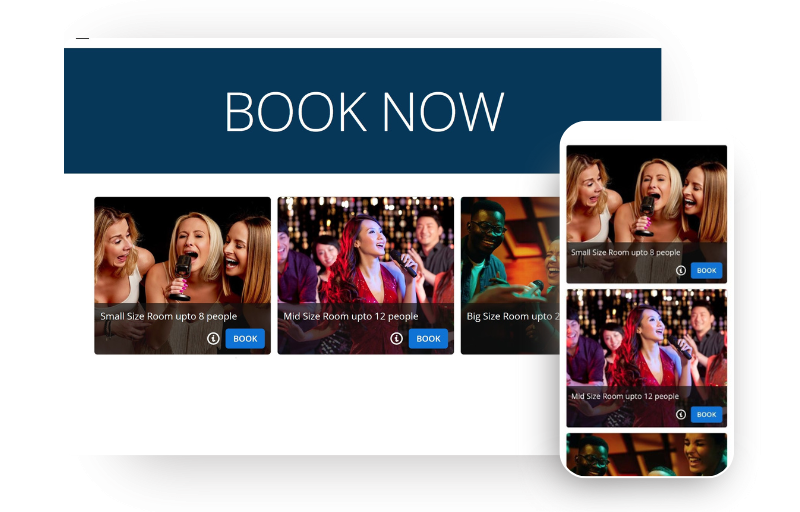
Everything You Need to Know on How to Start a Karaoke Business in 2024
Everyone feels like a rock star when they grab a microphone and sing their favorite song beneath the warm glow of the lights. While a private karaoke session in the restroom is convenient, nothing beats the intimate environment of a dedicated karaoke room for an unforgettable entertainment experience.
Regardless of your financial ability or musical passion, starting a karaoke business is anything but impossible. Karaoke bars have low entrance barriers and, when well managed, may create a regular cash stream. Now, the million-dollar question is: How can I start a profitable karaoke business in 2024?
How to Start a Successful Karaoke Business: Step-by-Step
Starting a karaoke business may seem intimidating at first, with endless questions such as “What am I missing?, How much should I invest?” and “How can I help it thrive?” springing to mind immediately. In order to answer all your inquiries about this market, we created a complete guide on launching and running a profitable karaoke business in 2024.
Step 1: Conduct an Extensive Market Research
Before you stop reading because the word “market research” reminds you of cheap advice everyone can give, keep in mind that you can’t skip this (boring) step when starting any business.

Here are some things to understand when performing market research for your soon-to-be karaoke business:
- Market demand: Take into account population density, nightlife trends, and entertainment preferences.
- Customer preferences: Collect data using surveys, interviews, or focus groups.
- Local competition: Learn about their offerings, how they market it, how much it costs, and who they want to buy it.
- Possible location: Explore prospective karaoke venue locations, taking into account foot traffic, visibility, and accessibility.
- Legal and regulatory: Requirements set by law and government, like zoning rules, permits, and licenses.
- Ongoing industry trends: Stay current with market developments and be adaptable to adjust your business approach accordingly.
Step 2: Create a karaoke business plan
If you are new to the business, your karaoke business proposal should address several key points:
- Brief description of your company market analysis: Present information on your mission and goals of your business. Assess who your customers are, who your competitors are and what do customers desire that isn’t available elsewhere.
- Staff members: Outline how the company is organized and operates, outlining all roles and responsibilities for stakeholders as well as outside advisors or consultants who might assist your company. Product and Service Offerings: Explain what products/services you sell as well as their features as well as pricing structures for those offerings.
- Sales & marketing: Develop a marketing plan, brand identity, and advertising/social media strategies.
- Operations: Determine where your business will operate daily, what equipment it needs and where the supplies will come from.
- Financial overview: Assessing how much your business will make and spend over time to determine when and where the breakeven point lies.
- Funding needs analysis: Measuring what amount is necessary to start and run your venture successfully, from its inception until completion.
Step 3: Calculate your budget (secure funding if needed)
Opening a karaoke business costs depend on several factors, including location, venue size and amenities available. Starting from scratch could require anywhere between $175,000 and $850,000 of initial funding; purchasing an existing bar could require anywhere between $25,000 to $40,000.

Here’s a list of possible expenses for starting a karaoke business:
- Venue rental or purchase: Costs can vary greatly based on factors like location, size and condition of a space; costs might include lease deposits, rent payments, or property purchase fees as potential expenses.
- Equipment: Karaoke machines, microphones, speakers, amplifiers, televisions or projectors, furniture lighting and soundproofing materials are essential items. Equipment costs for basic setups may range anywhere from several thousand to several tens of thousands for high-end systems.
- Modifications and decor: If your chosen location requires modifications or interior design to create an ideal karaoke environment, costs associated with materials, labor, and decor may become excessively high.
- Licensing and permits: These include company licenses, liquor licenses (if applicable), health permits, music copyright licenses and any other regulatory needs.
- Marketing & promotion: Allocate funds for advertising, branding, website development, social media marketing and promotional events to attract customers to your karaoke establishment.
- Operating expenses: These costs include utilities (electricity, water, and internet), insurance premiums, employee compensation costs, inventory (drinks and snacks), cleaning supplies and continuous maintenance expenditures.
- Contingency fund: It is essential to establish and keep up a contingency fund to cover unexpected expenses or crises that arise during the formation or early stages of any firm.
Step 4: Register your karaoke business
As your first step toward starting a karaoke business, selecting an eye-catching name should be your top priority. Make it original, short (if preferred) and easy to remember by drawing inspiration from any source such as your pet’s name or favorite color – or create one from scratch to capture what vibe you want your business to exude.
After choosing a name for your business, determine its structure – sole proprietorship (just you), partnership (with others), or corporation. Expect to have to fill out papers and make a small fee during your registration. Check for any licenses and permits needed in your region in order to legally run a karaoke business, such as entertainment licenses or health permits.

If hiring staff or opening separate bank accounts is part of your plans, an EIN issued by the IRS may also be needed. Maintain your knowledge of any new laws or regulations that could have an effect on your karaoke business. Since laws and regulations are subject to change, staying up-to-date is key.
Step 5: Set up your venue
Before choosing the location for your karaoke venue, make sure it suits its purpose by carefully considering factors like foot traffic, visibility and accessibility Once you’ve located the ideal space, sign a lease or rental agreement that meets all of your business needs regarding size, layout and amenities.
After this has been accomplished, install all necessary equipment such as microphones, speakers, screens and song selection systems. Next comes everyone’s favorite part: decorating and furnishing your venue! Strategize how you want to set up the space, including stage, seating arrangements, and refreshment area before ensuring all safety standards have been met before proceeding with planning the big day!
Step 6: Build a strong digital presence
In the 4.0 era, people are spending ever more time online. As of January 2024, more than 66% of the world’s population was online. You don’t want to lose out on the opportunity to reach 5.35 billion people.

Establishing a good digital presence is unquestionably an important aspect of beginning a karaoke business. To sum up, here are some important digital ways to use the brand’s website:
| Digital Platform | How to optimize |
| Website |
|
| Social Media |
|
| Online Advertising |
|
| Online Directories
& Reviews |
|
Step 7: Automate your booking system
A long line in front of a karaoke space is the last thing people want when they need to release stress and sing their lungs out. Having an online booking system can alter efficiency, accuracy, and customer experiences.
This automation saves time and lowers the possibility of errors associated with human booking processes. To automate your booking system, pick an online booking software like Bookeo to help manage reservations and appointments for your karaoke nights.

With Bookeo, you can input your karaoke nights, available time slots, and any special events into the booking system to let customers know when they can come and sing. Of all the online booking software, why Bookeo?
- Enable 24/7 online booking: Customers can book their karaoke sessions anytime, day or night, through your online booking page, providing convenience and accessibility.
- Customize your booking page: Customize your Bookeo booking page with your karaoke business logo, colors, and branding to make it look professional and inviting.
- Automate reminders: Use Bookeo’s automated reminder feature to send email or text reminders to customers before their scheduled karaoke session, reducing no-shows and ensuring a full house.
- Manage bookings easily: Access your Bookeo dashboard to view and manage all your karaoke bookings in one place, making it easy to track reservations, update availability, and process payments.
Step 8: Develop a solid marketing strategy
Your karaoke business won’t sell itself. While the initial excitement of opening may draw in clients, a long-term marketing strategy will keep your company competitive if done properly.

Here are seven considerations if this is your first time into marketing:
- Know your audience. Determine your target demographic, such as locals, visitors, or certain age groups who enjoy karaoke.
- Highlight your unique selling points: Determine what distinguishes your karaoke business—is it a diverse song selection, themed nights, or a friendly staff?
- Choose marketing channels: Choose where to promote your business, such as through social media, local events, brochures, or cooperation with nearby bars or restaurants.
- Create compelling content: Use social media to share interesting posts, photographs, or videos highlighting your karaoke nights, satisfied customers, and special offers.
- Encourage word-of-mouth. Offer incentives for clients to bring friends, and encourage satisfied customers to spread the word about their positive karaoke experience.
- Consider buying targeted advertisements: Especially on networks like Facebook or Instagram to reach more people in your area who enjoy karaoke.
- Track your results: Monitor which marketing campaigns are drawing the most customers and adjust your strategy accordingly to increase your influence.
Step 9: Soft launch and testing
Every business owner faces anxiety during the first launch and testing phase of their enterprise, so being prepared is crucial. Here are five things that will ensure a smooth soft launch/test phase for your karaoke space.
- Prep your venue: Prior to hosting your first karaoke night, ensure everything is ready, such as setting up equipment, decorating and training staff.
- Choose a theme (because why not): Create an engaging experience at your soft launch event by choosing an eye-catching theme such as “Throwback Thursday,” “80s Night,” or “Rock Star Party.”
- Invite a small audience: Invite only friends, family and local influencers to your soft launch event in order to test out systems and collect feedback before opening to the general public. This helps test out any necessary systems as well as gather valuable input before officially opening for business.

- Test operations: As part of your soft launch, pay special attention to how smoothly everything runs – from booking systems and sound quality, through customer service and service quality.
- Gather feedback: Solicit attendees’ thoughts about their experience. What did they appreciate and what could be improved upon?
- Adjust as needed: Make changes based on customer feedback and observations to enhance customer experience and ensure everything runs smoothly.
Step 10: How to host a grand opening
It’s best to be Monica Geller during this step because it takes more work to plan and get feedback for a big opening event. Make sure you tick all the boxes below to help you on the big day:
- Plan your grand opening: Establish the date, time, and location of your grand opening event. Utilize flyers, social media posts or local ads to bring people in for attendance. And as an incentive to bring more customers out – offer discounts or prizes as part of the grand opening celebration event to attract attention and gain momentum for sales!
- Entertainment: Provide musical performances or guest DJs during your grand opening celebration to keep attendees amused and create an environment conducive to celebration.
- Appropriate refreshments: To keep attendees engaged and motivated throughout an event, provide beverages, snacks or appetizers without charge as refreshments as refreshments.

- Hire a photographer: Or create a photo booth, to capture precious memories from your grand opening celebration and use for future promotions.
- Interact with attendees: Take time to interact with those who attended your grand opening event by greeting and thanking them on their way out, encouraging them to share their experience on social media, and asking if anyone wanted to continue the conversation with friends and followers.
- Take advantage of feedback: Now is an ideal opportunity to collect guest reviews of their experience at your karaoke business and listen to any constructive suggestions on how it could be improved.
FAQ for Starting a Karaoke Business
There are many things to consider before deciding to open a karaoke business. To make decision-making easier, check out 9 common questions often asked before starting a karaoke business.
1. Is karaoke a profitable business?
Yes, karaoke is a profitable business. Karaoke businesses in the United States generate an average annual revenue between $250,000 to $500,000. Based on recent statistics, the global Karaoke market looks promising over the next five years.

Important factors affecting its profitability include location, target audience, effective marketing and operational efficiency. Karaoke businesses that thrive in areas with strong entertainment demand and vibrant nightlife culture can attract new customers over time and generate healthy revenue streams.
2. What equipment do I need for a karaoke business?
- Karaoke machine or system: For optimal singing sessions, invest in a reliable karaoke system or machine featuring features such as microphone and amplifier connectivity as well as an inbuilt song library or compatibility with karaoke software.
- Speakers: For optimal karaoke sessions, purchase high-quality speakers to provide clear and powerful sound output during sessions, keeping factors like size, power output and portability in mind.
- Microphones: For solo artists and group singers alike, microphones should be durable, wireless, and easy to use. Aim for multiple microphones in different price points that meet these criteria.
- Display screens: Utilizing display screens such as TVs or projectors, lyrics can be displayed to singers and audience members during performances, making sure that they’re large, visible, and strategically positioned on screen.
- Songs library: Create an expansive song library featuring various genres and languages with physical discs or digital downloads compatible with your karaoke system.
- Furniture and decor: For an inviting and enjoyable atmosphere at your karaoke venue, furnish it with comfortable seating, tables, and decor to make sure the experience of all guests is pleasant.
- Lighting: Install lighting fixtures like stage lights and disco balls to enhance the ambiance and create an engaging experience during karaoke nights.
- Recording equipment: When investing in recording equipment to capture singers’ performances for playback or sharing, make sure it includes audio interfaces, mixers and recording software.
3. How much does it cost to start a karaoke business?
Costs associated with opening a karaoke business vary significantly based on factors like location, venue size, equipment quality and any additional services provided. A reasonable estimate for startup expenses ranges between $175,000 to $850,000 if starting from scratch or between $25,000-$40,000 when purchasing an already established bar.
4. What insurance does a karaoke business need?
With so many potential dangers, karaoke establishments need a wide range of insurance policies. General liability coverage is crucial, protecting against claims for bodily injuries or property damage occurring on-premises due to incidents like slip-and-falls or equipment malfunctions; property coverage protects equipment and furniture against fires, theft or vandalism losses.

Liquor liability insurance is essential if the venue serves alcohol, to offset liabilities arising from accidents caused by inebriated patrons. Worker compensation coverage can help pay medical expenses and lost wages associated with work-related injuries or illnesses that occur on the job, including medical costs, lost wages from medical treatments, and lost wages from workplace events or illnesses. Other coverage requirements of karaoke businesses include commercial auto, cyber liability and professional liability policies.
5. Do I need to obtain copyright licenses for karaoke songs?
Yes, securing copyright rights for songs available in your karaoke catalog is absolutely crucial to avoid legal complications. Check with organizations like ASCAP, BMI and SESAC to determine which tunes require permission before public performance.
Once you have identified which songs require licenses, negotiate and obtain them legally so they may be used legally in your karaoke business. To prevent copyright infringements and keep complete records of all songs licensed as well as agreements or payments made.
6. What are some common challenges faced by karaoke business owners?
Every karaoke business may face different challenges, but here are some common industry obstacles to overcome:
- Licensing and copyright: Before offering songs for sale, ensure you possess all necessary licenses from copyright agencies to avoid legal issues.
- Equipment maintenance: Regular maintenance will help your karaoke equipment run more smoothly during events, and help prevent technical glitches from cropping up during performances. Schedule regular inspections and repairs so there won’t be any technical glitches during performances.
- Customer engagement: Keep customers entertained by offering an eclectic music selection, hosting themed nights and encouraging audience participation. Listen carefully for feedback and make adjustments as necessary.
- Stay competitive: Stay ahead of your competitors by providing unique experiences, promotions and excellent customer service. Distinguish yourself through innovative marketing strategies and partnerships with local venues.
- Staff training: Make an investment in staff training to ensure exceptional service and proper operation of equipment. Inform them on customer interactions as well as ways to overcome common issues.
- Financial management: Gain an in-depth understanding of your finances, such as income, expenses and profit margins. Set budgets accordingly, track expenses carefully and plan for unexpected costs in order to ensure long-term sustainability.
7. What are the legal requirements for starting a karaoke business?
If you want to start a karaoke business, you may need to get business licenses and permits to serve alcohol (if needed), follow zoning rules, and make sure you meet health and safety standards. It is recommended to talk to an experienced lawyer to make sure that all local laws and rules are followed.
8. How do I choose the right location for my karaoke business?
Consider locations with high foot traffic, visibility and accessibility. Also factor in demographics of the area, competition for parking spots and proximity to public transportation as factors when making this selection. Lastly, ensure the space can accommodate soundproofing measures to prevent disturbing neighboring establishments or residents with noise pollution issues.
9. How can I attract customers to my karaoke business?
Good marketing is needed to draw customers to your karaoke bar. You might want to try some of these methods:
- Announce important events: Karaoke nights with themes like “80s Night” or “Pop Diva’s Night,” will bring in a wide range of people with different tastes. Give discounts or special deals: Offer deals like lower prices for groups, happy hour deals, or free drinks for singers as special rewards to get more people to come in.
- Socials: Utilize social media sites like Facebook, Instagram and Twitter to engage people online and attract potential customers. You can post about upcoming events, show pictures from karaoke nights, or simply interact with potential new clients who might become customers in the process.

- Work together with nearby companies: Make friends with nearby restaurants, bars, and event spaces so that you can promote each other’s businesses and get more people to come to your singing nights.
- Make it a fun atmosphere: Add bright lights, themed decorations, and comfortable seating.
- Offer a range of songs: Make a nice-looking music library with well-known songs from various eras and styles to suit a wide range of tastes.
Conclusion
Getting into the karaoke business is an amazing opportunity to create memorable entertainment experiences while tapping into a valuable market. However, opening a karaoke business involves careful planning, from doing extensive market research to raising funds and navigating legal challenges.
This is why we at Bookeo are here to help you at every stage of the process. Our extensive booking system and customizable features let you streamline operations and improve customer experiences, ensuring your karaoke business grows in 2024 and beyond. Sign up with Bookeo today and make your karaoke space the talk of the town!

